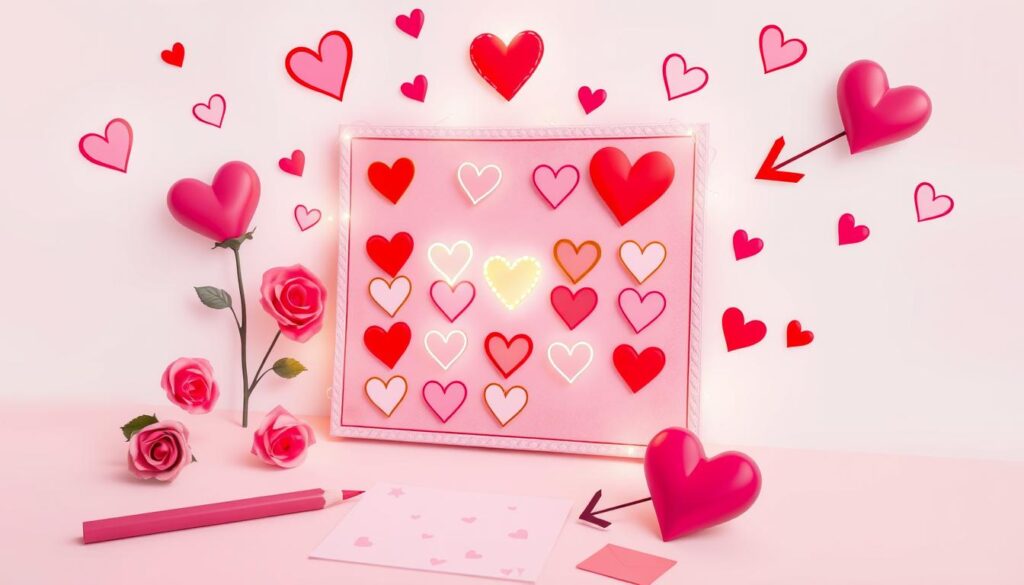Have you ever caught yourself gazing out a window, deeply pondering if what you feel is really love? This moment is common—your heart skips a beat, and your thoughts race with questions and doubts. Assessing your feelings towards someone can be like standing at a huge ocean’s edge, filled with emotions.
Waves of uncertainty surround you, yet you seek clarity deep inside. On this journey of self-discovery, you’re not just looking at a relationship. You’re diving into your emotional bond with another, trying to understand if your feelings are true love or something different. It’s important to explore these feelings with bravery, truth, and an adventurous spirit.
Key Takeaways
- Understanding your feelings is crucial before making decisions about love.
- Love can be multifaceted, encompassing a range of emotional connections.
- Assessing feelings involves looking inward and asking difficult questions.
- Awareness of attachment styles can impact your understanding of love.
- Recognizing the signs of love can guide your journey.
- Reflection is essential in determining if what you feel is love or infatuation.
Understanding Your Emotions
Recognizing and understanding your emotions is key in relationships. It helps you figure out if you’re truly in love or just infatuated. This understanding gives you clearer insights.
Talking about feelings makes 90% of couples feel more stable together. It’s important to openly share emotional experiences. Discussing feelings can also make your relationship better. Most issues in love come from not meeting each other’s needs.
Nearly 60% of people say their harsh actions come from their own emotional issues. Knowing this can help you treat your partner more kindly. Most couples find that being compassionate lowers fights.
Setting clear emotional boundaries is necessary for a healthy relationship. This can make both partners feel safer, emotionally. Looking back on your past helps you understand your reactions better. Most people find that their current feelings connect to past events.
Understanding your emotional habits opens your eyes. Ask yourself some key questions to explore your feelings better. Here are a few to think about:
- What emotional trends do I see in my relationships?
- When have I felt like this before?
- How do my past experiences shape how I feel now?
Taking time alone to think about your emotions can be beneficial. Not all feelings need immediate action. Sometimes, letting some emotions pass can be helpful. Getting support from friends or pros is also crucial for well-being.
Learning more about your emotions can improve your relationships. It makes you better at handling complex emotions and making decisions about love. Putting effort into understanding your emotions can deeply enrich your relationships.
What Is Love? Defining Your Feelings
Love is a complex feeling, different for everyone. It mixes various emotions and ties that are unique to each person. By knowing the forms of love, you can better understand your feelings and relationship dynamics. Romantic love often stands out, while platonic love offers friendship that’s just as valuable.
The blend of romantic and platonic love shapes how we feel intimacy and connection.
Different Types of Love: Romantic vs. Platonic
Romantic love is marked by intense feelings, attraction, and a longing for a deeper bond. Platonic love focuses on friendship and affection without sexual desire. This type is key in friendships, deeply enriching your life. These loves play central roles in our lives, sometimes mingling to create a complex web of relationships.

Understanding Attachment Styles
Attachment styles greatly affect your view and expression of love. There are three main styles: secure, anxious, and avoidant. Each style shows different approaches to closeness and relationships:
| Attachment Style | Characteristics | Impact on Relationships |
|---|---|---|
| Secure | Comfortable with intimacy, trusting | Promotes healthy communication and commitment |
| Anxious | Craves closeness and validation | May lead to dependency or fear of abandonment |
| Avoidant | Value independence, often distant | Can hinder emotional intimacy and connection |
Knowing your attachment style can guide you in navigating your relationships and understanding the love you feel. As you look into your emotions, think about how these elements blend together. They form the base for meaningful connections in our lives.
Signs You Might Be in Love
It’s helpful to know the signs of love. Love mixes emotions and physical attraction beautifully. Knowing the difference helps you understand your real feelings better. Let’s look at what shows you might be in love.
Identifying Emotional Connection
Feeling deeply connected is a big sign of love. This connection shows in different ways:
- Thinking about your partner a lot, remembering conversations or fun times.
- Telling them about your day because you really want to, like most do.
- Feeling more empathy and caring, as 75% of people in love do.
- Feeling happy and safe when you’re together.
- Changing your plans to fit theirs, which 80% of couples do.
Physical Attraction vs. Deep Affection
Physical attraction is just the start, but real love is more. It combines attraction with emotional bonds. While a spark can start things, true love is about deeper feelings and connections:
| Aspect | Physical Attraction | Deep Affection |
|---|---|---|
| Focus | Looks and physical presence | Emotional closeness and shared moments |
| Duration | Usually short-lived | Can last many years and get stronger |
| Effects | Excitement and a rush, thanks to dopamine | Feeling safe, supported, and happy |

Understanding these differences helps you see what your feelings mean. Think about whether it’s just attraction or a deep emotional connection. If it’s more about affection, you might be feeling one of life’s greatest joys.
Do I Love Him? Asking the Right Questions
Understanding your feelings means looking closely at them with love questions. These questions help you know how you really feel about your partner. They also help you figure out your relationship in a meaningful way. Asking deep questions can show you parts of your relationship that may need work.
Questions to Explore Your Feelings
Think about these questions to understand your love and emotional bond better:
- Do I feel happy when I am with him?
- Am I eager to learn more about his likes, dislikes, and life experiences?
- How comfortable do I feel sharing my vulnerabilities with him?
- Are there moments where I feel genuinely understood by him?
- What specific actions make me feel cherished in the relationship?
Evaluating Your Relationship Dynamics
Looking into how you both give and get emotional support is important. Studies show that asking personal questions can make you both happier and lessen misunderstandings:
| Aspect | Impact Percentage |
|---|---|
| Increase in relationship satisfaction through intimate conversations | 50% |
| Improvement in emotional understanding with specific inquiries | 30% |
| Reduction of conflicts due to supportive questioning | 40% |
| Lower chance of relationship breakdowns with emotional check-ins | 60% |
It’s key to see how you both share needs and wants. About 80% of people notice better relationship dynamics when they ask questions on time. This can greatly improve how connected you feel, helping you both understand each other more deeply.

The Role of Limerence in Your Feelings
Limerence is about feeling a strong desire for connection that looks a lot like love. It creates an emotional obsession leading to mixed emotions. In early attraction stages, it brings an intense longing and puts someone on a pedestal. This can confuse people, making them think it’s real love.
People absorbed in limerence think a lot about the one they like, called the Limerent Object (LO). About 70% might mix up this with love, especially if they think the feeling might be mutual. This mix of excitement and unsureness adds to the *infatuation.* Feelings of vulnerability are common as people long for the affection and approval they want from the other person.
The table below spotlights the main differences between limerence and healthy love. It helps explain how to deal with these challenging emotions:
| Aspect | Limerence | Healthy Love |
|---|---|---|
| Duration | Often time-limited (weeks to years) | Long-lasting, deepening over time |
| Emotional Connection | Can be one-sided, marked by emotional obsession | Mutual and reciprocal emotional attachment |
| Emotional Turmoil | Significant mood swings and instability | Involves stability and reassurance |
| Idealization | Inability to see flaws in the LO (65% of individuals) | A realistic appreciation of each other’s strengths and weaknesses |
| Dependency | Up to 50% rely on the LO for happiness | Balanced independence and support |
Realizing the impact of limerence on your emotions is key to building healthier relationships. By knowing the difference between mere infatuation and real love, you can aim for deeper, more meaningful connections. This helps you avoid the emotional maze that often comes with limerence.

Are You in Love or Just Infatuated?
Do you know if you’re in love or just infatuated? It’s crucial to understand the difference. Infatuation is all about intense feelings and a fast heartbeat. It’s thrilling but can feel a bit out of control. Love, on the other hand, grows slowly. It’s built on friendship, trust, and talking openly.
A study with 300 people found links between how we attach to others and love addiction. People who are scared of being left might confuse infatuation for love. Real love requires effort from both sides. It involves mutual respect and understanding.
Signs of infatuation are:
- Racing heart and anxiety
- Feeling attracted right away without a deep connection
- Lack of meaningful talks and support
Meanwhile, love is different in many ways:
- Feelings grow over time
- Love includes shared dreams and stable feelings
- It’s based on being friends first
Friendship is key in love. It brings more warmth and support, making the relationship stronger. By figuring out if it’s love or infatuation, you can make better choices for your heart and future.

How to Assess Your Feelings Effectively
Understanding your emotions is key to knowing yourself better. Self-reflection sheds light on what you truly want and how you react. It lets you face and name feelings hidden by fear or doubt.
Self-Reflection Techniques
Self-reflection can change your life. Writing in a journal and practicing mindfulness can help you understand your emotions better. Here are ways to improve your self-reflection:
- Journaling: Write daily about your thoughts and feelings. It makes it easier to express emotions that you haven’t talked about.
- Mindfulness Meditation: Take time to sit quietly and watch your thoughts. Observe your emotions without judging them.
- Emotional Check-Ins: Stop regularly to think about how you’re feeling throughout the day. Ask yourself about your emotions and their reasons.
Taking a Relationship Inventory
A relationship inventory shows trends in how you interact with people. Reviewing your past and present relationships reveals lessons for expressing emotions better. Consider these factors in your inventory:
| Relationship | Key Learning | Emotional Patterns |
|---|---|---|
| Past Romantic Relationships | Realized being open is necessary | Afraid of letdown, I kept feelings inside |
| Friendship Dynamics | Learned sharing equally is key | Had trouble sharing needs due to fear of rejection |
| Family Interactions | Talking openly improves connections | Often downplayed emotions in talks |
Starting your assessment journey through self-reflection and checking your relationships is important. Knowing how to handle emotions well boosts your happiness. Accepting your feelings instead of ignoring them helps build stronger connections with others.

The Impact of Past Relationships on Your Current Feelings
Understanding how past relationships affect your feelings today is key. Your feelings often come from what you’ve learned in earlier relationships. Knowing this helps you be more conscious and purposeful in love now.
Recognizing Patterns in Your Romantic History
Many people think a lot about their exes, sometimes for years. This shows a pattern that comes up after breaking up. Initially, these thoughts are strong but they usually get less over time.
To move on, it’s wise to keep your distance from ex-partners. Cutting off contact helps you heal emotionally.
- Approximately 70% of people tend to repeat undesirable relationship patterns unless they actively engage in self-reflection.
- Almost 75% of individuals with unresolved emotional wounds struggle to form deep connections in new relationships.
- About 65% exhibit signs of self-sabotage, frequently questioning the viability of their current partnerships.
- Emotional baggage can lead to a 60% increase in trust issues, complicating new romantic connections.
Learning from Past Experiences
Learning from your past love life can change things for the better. Around 80% see their old patterns come back unless they choose to change. Talking about your past can clear up confusion—85% think so.
Writing down your thoughts helps over 50% of people spot what upsets them in love now.

If past hurts are holding you back, 40% recommend getting help from a therapist. Therapists help you understand how past love impacts you today. Mindfulness can also make relationships 30% better by improving closeness and creating new happy memories.
Telltale Signs That You Are Actually in Love
Finding out if you’re truly in love is a unique path. It’s a mix of following your heart and thinking it through. Knowing if it’s real love goes beyond just being attracted to someone. It’s about feeling a deep emotional bond and showing real care for each other.
Intuition vs. Logic: Trusting Your Gut
Listening to your intuition is key when figuring out your feelings for someone. About 65% of people think about their significant other a lot when they’re in love. This constant thinking is a sign of a strong bond; it shows you feel more than what logic can explain. Being in love makes you feel strong emotions. Chemicals like dopamine and serotonin play a role in how you see your partner and your relationship.
Behaviors That Indicate Genuine Affection
There are several behaviors that show real love is there:
- Willingness to Overlook Flaws: Nearly 70% of those in love ignore small faults in their partner, showing deep acceptance.
- Desire for Togetherness: About 75% want to spend a lot of time together, showing they enjoy being with each other.
- Emotional Reminders: Around 80% of lovers are reminded of their partner by things like songs, showing ongoing emotional ties.
- Idealization: Some 60% put their partners on a pedestal, showing a deep emotional connection beyond just a crush.
- Strengthening of Affection: Love grows over time, proving it’s more than just a brief infatuation.
- Physical Presence: Finding joy in simple activities together strengthens the bond you share.
| Indicator | Percentage |
|---|---|
| Thinking About Partner Frequently | 65% |
| Willingness to Overlook Flaws | 70% |
| Desire for Togetherness | 75% |
| Noticing Emotional Reminders | 80% |
| Idealizing Partner | 60% |

Seeking Clarity Through Self-Awareness
Building self-awareness is key to understanding your feelings about love. It requires looking inside yourself and honestly assessing your desires and needs. Many people fall into patterns that obscure their true feelings. Recognizing these patterns offers vital emotional insight and can lead to clearer understanding of love.
Take Samuel, who at 32, realized none of his five relationships had satisfied him. This was his wake-up call to self-discovery. He discovered three great things about himself, which helped him understand what he really wanted from love. Knowing what he looked for in a relationship became crucial.
Using the six principles of C.L.A.R.I.T.Y—Calm, Liquid, Anchored, Reflective, Transparent, and Yielding—improves self-awareness. These principles guide through emotions and foster healthier relationships. Spotting early signs of trouble, or icebergs, can save a relationship from big problems.
Perfection isn’t necessary for love. Many feel needy and pressure their partners, leading to unhappiness. Embracing self-love leads to better relationships. It fills you up emotionally, making you more secure and less worried.
Self-compassion and caring for yourself have huge benefits. Exercising and eating well can make your relationships better. Also, pursuing your passions can give you an exciting social life, improving your love life too.

| Principles of C.L.A.R.I.T.Y | Description |
|---|---|
| Calm | Maintaining a peaceful mindset to navigate emotions effectively. |
| Liquid | Being adaptable to changes and flexible in relationships. |
| Anchored | Staying grounded to one’s values and priorities. |
| Reflective | Engaging in thoughtful consideration of personal feelings. |
| Transparent | Open communication about needs and boundaries. |
| Yielding | Finding the balance between giving and receiving in relationships. |
Turning to Quizzes for Insights
Love quizzes are a fun way to explore your relationship feelings. They help you dig deeper into your emotions about relationships. By taking “Do I Love Him” quizzes, you answer thought-provoking questions. These questions help you understand your feelings and how you interact in your relationship.
How “Do I Love Him” Quizzes Work
These quizzes have a variety of questions. The questions make you think deeply, offering valuable insights into your emotions. They are simple and easy to understand, avoiding complicated words. The quizzes cover your feelings, what you look for in relationships, and must-have qualities in a partner.
Taking these quizzes leads to personal discoveries. It’s a way to uncover feelings you might not have recognized. When you reflect, you gain clarity on what’s important to you in a love relationship.
- Self-Reflection: Assess your feelings in a structured manner.
- Emotional Evaluation: Understand your emotional responses to different scenarios.
- Clarity on Relationship Desires: Define what you truly want in a partnership.

Discussing Your Feelings with Friends or a Therapist
Talking about complex emotions with friends or a therapist can be very helpful. Friends are great for immediate emotional support. They understand you and can offer advice based on what you both have gone through. Talking to them lets you express yourself freely, without fear of being judged.
Therapists bring something different to the conversation because of their training. They can spot patterns and understand feelings in a way friends can’t. This expertise can lead to deeper insights. While friends are great for support, therapists provide a special space focused on you.
Therapists also offer confidentiality, something that sets them apart from friends. They have to keep your conversation private by law. This makes therapy a safe place to talk about tough things. People often feel more secure and open in therapy, helping them heal.
Here’s a comparison of support systems to illustrate their differences:
| Aspect | Friends | Therapists |
|---|---|---|
| Training | No formal training | Extensive education and clinical practice |
| Confidentiality | Less assured privacy | Legally obligated to maintain confidentiality |
| Focus of Support | Anecdotal advice | Professional insights and techniques |
| Nature of Relationship | Reciprocal | Non-reciprocal, client-centered |
| Consistency of Support | Variable | Structured sessions |
| Cost | Free | $100 to $250 per hour |

Many pick friends for support because it’s easy and immediate. But, it’s important to see the difference between this and professional help. Therapy can really help with anxiety and depression. It offers structured, judgment-free support. This kind of professional help can lead to big personal growth, giving you strength to handle your feelings.
Conclusion
Throughout our exploration of love, we’ve looked into many aspects of our feelings. We’ve thought deeply about what love really means. Understanding our feelings helps us deal better with our relationships.
By thinking about what we’ve learned, we’re better at dealing with our emotions. This leads to personal growth. It’s about seeing our feelings clearly and using that knowledge wisely.
Consider how your past affects how you feel now. Sometimes, old hurts or quick judgments can mess up our connections. Knowing this can help us make our emotional ties stronger.
Having open talks can help avoid misunderstandings. This makes our relationships with our partners stronger. It’s about knowing how to communicate well.
In the end, being clear about our emotions and always checking in on our love life makes things better. Personal growth is ongoing—it’s all about moving closer to honesty in our relationships. Let’s treasure what we’ve learned. Let it lead us to more meaningful connections.










